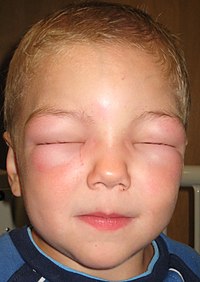
Photo from wikipedia
Background: Previous experimental and clinical studies have shown that anesthetic agents have varying effects on cancer prognosis; however, the results were inconsistent among these studies. The authors compared overall and… Click to show full abstract
Background: Previous experimental and clinical studies have shown that anesthetic agents have varying effects on cancer prognosis; however, the results were inconsistent among these studies. The authors compared overall and recurrence-free survival in patients given volatile or intravenous anesthesia for digestive tract cancer surgery. Methods: The authors selected patients who had elective esophagectomy, gastrectomy, hepatectomy, cholecystectomy, pancreatectomy, colectomy, and rectal cancer surgery from July 2010 to March 2018 using the Japanese Diagnosis Procedure Combination database. Patients were divided into a volatile anesthesia group (desflurane, sevoflurane, or isoflurane with/without nitrous oxide) and a propofol-based total intravenous anesthesia group. The authors hypothesized that total intravenous anesthesia is associated with greater overall and recurrence-free survival than volatile anesthesia. Subgroup analyses were performed for each type of surgery. Results: The authors identified 196,303 eligible patients (166,966 patients in the volatile anesthesia group and 29,337 patients in the propofol-based total intravenous anesthesia group). The numbers (proportions) of death in the volatile anesthesia and total intravenous anesthesia groups were 17,319 (10.4%) and 3,339 (11.4%), respectively. There were no significant differences between the two groups in overall survival (hazard ratio, 1.02; 95% CI, 0.98 to 1.07; P = 0.28) or recurrence-free survival (hazard ratio, 0.99; 95% CI, 0.96 to 1.03; P = 0.59), whereas instrumental variable analyses showed a slight difference in recurrence-free survival (hazard ratio, 0.92; 95% CI, 0.87 to 0.98; P = 0.01). Subgroup analyses showed no significant difference in overall or recurrence-free survival between the groups in any type of surgery. Conclusions: Overall and recurrence-free survival were similar between volatile and intravenous anesthesia in patients having digestive tract surgery. Selection of the anesthetic approach for these patients should be based on other factors. Among more than 190,000 patients who had cancer surgery, overall and recurrence-free survival were comparable in patients who had propofol-based total intravenous and volatile anesthesia. Selection of anesthetic approach should be based on factors other than putative effects on cancer recurrence. Supplemental Digital Content is available in the text.
Journal Title: Anesthesiology
Year Published: 2020
Link to full text (if available)
Share on Social Media: Sign Up to like & get
recommendations!